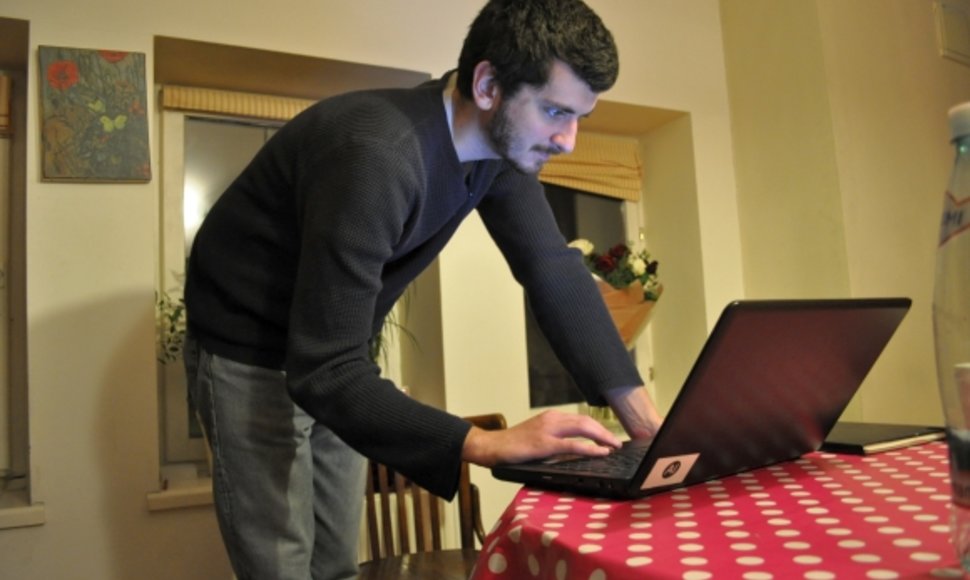Tiny smoke-filled room in Pabrade Foreigners Registration Centre boarding house. This is where illegal migrants from Georgia spend their days. Some of them wait before they can go back to their home country, others wait for their chance to escape and hitchhike further to Western Europe. For them, Lithuania is but an intermediary stop in their hapless quest for happiness and economic wellbeing.
Meanwhile in downtown Vilnius, another Georgian, Ivane Ksnelashvili, is making tea in his cosy rented apartment and rejoices over his dream come true – to work and live in Lithuania.
Intermediary stop
Last year, half of the 508 illegal migrants interned in Pabrade were Georgian citizens. This nation surpassed the previous “leaders” from Afghanistan, Chechnya, and more distant countries. What drives them to Lithuania?
“Most of them were caught illegally crossing Belorussian-Lithuanian border. And even though everyone declares their intent to try and find a better life in our country, at the first opportunity they go further west,” Giedrius Mišutis, head of public relations at State Border Control says.
Foreigners Registration Centre is not a prison. Foreigners that are interned here are allowed to go to town for 24 hours and do whatever they please. They are only missed when they do not return after one day. On average, a migrant spends three to four months in the Centre. After that they usually go missing. Officers go looking for fugitives and if they find them, they send them back to Pabrade where they are tried and repatriated to Georgia. Only a tiny fraction of migrants get convinced by the Centre employees that being an illegal in the European Union is little joy and return home of their free will.
It is next to impossible for Georgians who came here illegally to be granted asylum in Lithuania. According to the Department of Migration data, over the first nine months of 2011 not a single Georgian citizen had their application accepted – 125 applications were refused, 48 more dismissed while in examination.
“I believe that Lithuania should not give out residence permits,” George Kerdikoshvili, Georgian ambassador, has a strong opinion about illegal migrants. He is convinced that Georgians have no business looking for economic wellbeing or political asylum in Lithuania, since Georgia is a fast developing democratic country.
There is, however, a third option. Some of the illegal migrants are people with criminal past who cannot get visas and have nothing to lose desperately seeking a different life.
Sees Russian hand
Residents at Foreigners Registration Centre are weary of journalists. “Neponemayu po ruski (I don't understand Russian),” a young man retorts and runs out for a smoke.
Supervising officers understand them well. “It's a sensitive and painful topic that no one living here wants to talk about, especially because, in most cases, it has to do with criminal pasts,” Remigijus Volikas, interim head of Foreigners Registration Centre. As to why so many illegal migrants from Georgia have been coming to Lithuania recently, he suggests that the reasons lie in internal processes that currently unroll in that country.
The Georgian ambassador Mr Kerdikoshvili, on the other hand, thinks that the problem is not exclusively internal and that a Russian “hand” might be involved. “It is only natural that some people seek economic wellbeing at all costs. After all, many Lithuanians had worked in the UK illegally too, before they were granted work permits. It is not, however, these migrant workers that we should be concerned about, but people with criminal pasts,” the ambassador says.
He heard confessions of several Georgian migrants back in 2008, during the Georgian-Russian war, and agreed to share the story.
“To begin with, at one point a number of Georgian criminal leaders and minnow were forced out of the country. Many moved to Russia, because there they found favourable environment to carry on with their activities,” the ambassador recounts.
At around that time, he says, in 2008, when tensions were high, Russian special services summoned these Georgians with criminal pasts and ordered them to travel to Estonia, Lithuania, and Poland (countries that were most vocal in supporting Georgia during the Russian-Georgian war). Allegedly, they were told to go to those countries, seek asylum and in the mean time commit crimes thus undermining good relations between Georgia and her supporters. In exchange they were allegedly promised that their families back in Russia will be taken care of.
Coincidentally or not, it is precisely after 2008 that the number of Georgians, illegally crossing Lithuanian-Belorussian border, has been steadily rising. “Poland has dealt with this problem, with a help from Ukraine that tightened her border control. It is evident that Lithuania will not receive similar assistance from Belarus,” the ambassador adds.
New life in Lithuania
An increasing number of Georgians have recently come to Lithuania in perfectly legal ways.
More and more Georgians come to Lithuania to study, volunteer or work on various exchange programs. “Virtually every higher education institution in Lithuania has at least several Georgian students. We follow their achievements and it gives us pride that they represent Georgia in the best light through their academic excellence,” Mr Kerdikoshvili says proudly.
An excellent example is given by Ivane Ksnelashvili, an architect from Georgia. He could not believe his luck when, in 2008, he won a Gergian President's grant to do a master's degree in Lithuania.
Ivane confides that the first few days in Lithuania were difficult. “Studying in Vilnius Gediminas Technical University is much more challenging than in Georgia, perhaps because the standards are higher. Also, I needed time to adjust to things,” the young man says.
He was very motivated, though. After a difficult start, Ivane graduated with a best master thesis award in his hands. “This encouraged me to try and find ways to establish myself in Lithuania, perhaps even to get a job here,” he says.
Returning to Georgia, Ivane worked hard in Tbilisi and applied the newly-gained knowledge in his hometown. Even though the Caucasian nation is experiencing steady economic growth, with new buildings and entire cities being designed, the young architect never gave up on his idea to come back to Lithuania. “Yes, Georgia is a very exciting place to be right now, everything is growing, but I want to see more of the world, to work in different environment and return to my country full of new ideas,” says Ksnelashvili.
He found a firm in Vilnius and came back to Lithuania for a three-month internship. Then he plans another trip back home and after that he already has a two-year permit to live in Lithuania and work in the firm.
Ivane believes he is very lucky because very few Georgians who leave their country do actually get a visa and a permit to work in an EU country. “I am happy that things turned out this way: I won a grant, I got an internship, and finally landed a job. Others have to struggle much more,” he says.













